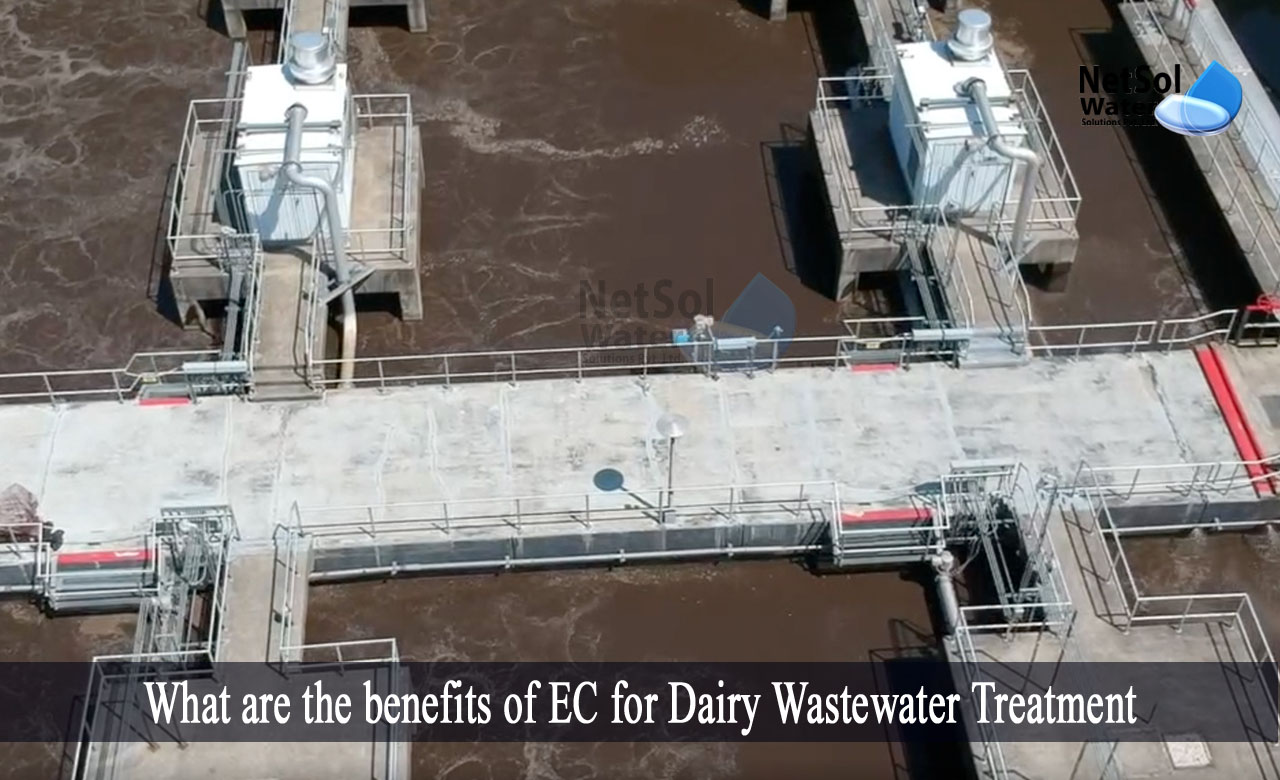What are the benefits of EC for Dairy Wastewater Treatment?
Due to the high global consumption and demand for dairy products, the dairy industry is quite large. Water, like many other foods and beverages, is an important component in their production. Water is not used much as an ingredient in dairy products, because milk is one of the main ingredients, but it is widely used for cleaning and washing, disinfection, and heating and cooling.
As a result, dairy wastewater treatment solutions are required to meet these specifications. Various technologies are used for dairy wastewater treatment. Among these, electrocoagulation provides various benefits in dairy wastewater treatment.
Contaminants in Dairy Industry wastewater
Depending on the product and manufacturing methods, wastewater from dairy facilities can contain a variety of contaminants. TSS, BOD, COD, nitrogen, phosphorus, fats, oils, and grease, are common contaminants.
Advantages of electrocoagulation for the treatment of dairy industry wastewater
1. Flocculation and sedimentation
One of the main reasons coagulation treatments are so popular, is their ability to sediment and flocculate particles in dairy wastewater treatment. These particulates can include heavier particles that settle at the bottom of the reaction tank, as well as lighter substances like fats that can float to the top.
The charge applied to the electrodes and the resulting metallic ions released from the anode, can cause the solution to destabilize and solids to coagulate, and precipitate out of the solution, while bubbles produced on the cathode lift lighter particles to the tank's surface as floc. This process facilitates solids’ separation during the post-clarification process.
2. Sludge's New Value
Sludge is a by-product of many coagulation processes. Because, of the chemicals used in this process, the sludge produced by chemical coagulation is quite abundant and potentially harmful. As there are no chemical additives (other than pH adjustment) in EC, the produced volume of sludge is lower, and the sludge is frequently non-hazardous.
As an added bonus, the non-hazardous sludge produced by the dairy wastewater treatment process can be reused.
Nitrogen and phosphorus are common ingredients in fertilizers, because they promote healthy plant growth. During the EC process, the nitrogen and phosphorus in dairy wastewater will precipitate into the sludge, which could potentially be sold to local farms or horticultural industries, as a beneficial soil additive.
3. Recyclability of Fats
Other types of milk, except whole milk, have lower fat contents. Some of the original raw milk fat content is eliminated from 2%, 1%, and skim milk. That leftover fat may end up in the production facility's wastewater. As previously stated, the cathode bubbles cause fats to float to the top of the tank, during the EC process.
This fat, as well as other flocculated particles from dairy WWT, can be skimmed from the solution's surface. The fat can then be separated from the rest of the plant, and potentially used as a recycled energy source. One possible application is as a heat source for any boiling units in the system.
4. Ease of Use and Maintenance
The EC system is relatively simple to operate once the system's details, such as the optimal pH, optimal current density, and optimal electrode material and arrangement, have been ironed out.
Larger systems are automated to further simplify operations. The design of EC systems also makes maintenance, simple and straightforward.
5. Reusing Water
In the face of water scarcity, it is critical that businesses become more conscious of their raw water usage, now and in the future. The dairy industry, as a large user of raw water, must find ways to be more sustainable in their water usage. Reusing wastewater is one way to accomplish this.
Conclusion
This is simple to accomplish with an efficient dairy wastewater treatment system. One such treatment method is electrocoagulation, which is combined with other processes such as filtration, clarification, and a disinfection unit, to polish/eliminate any remaining biological contaminants.
Water that has been sufficiently treated can be reused for processes, such as equipment cleaning or cooling. Furthermore, by reusing wastewater, the dairy company's operating costs associated with raw water consumption, can be reduced.
How can we assist?
Netsol Water is a pioneer in the integration of electrocoagulation technology, into dairy wastewater treatment systems. With previous clients in this industry, we have used our own advanced EC systems, to help them enhance their wastewater treatment process, in order to meet regulatory guidelines and sustainability goals.
Netsol Water is Greater Noida-based leading water & wastewater treatment plant manufacturer. We are industry's most demanding company based on client review and work quality. We are known as best commercial RO plant manufacturers, industrial RO plant manufacturer, sewage treatment plant manufacturer, Water Softener Plant Manufacturers and effluent treatment plant manufacturers. Apart from this 24x7 customer support is our USP. Call on +91-9650608473, or write us at enquiry@netsolwater.com for any support, inquiry or product-purchase related query.



